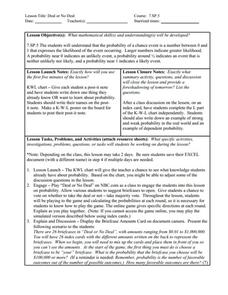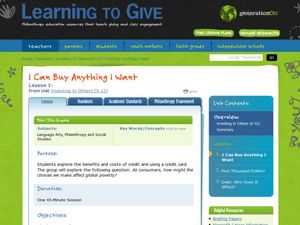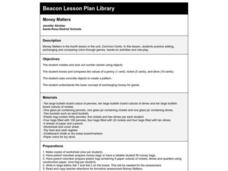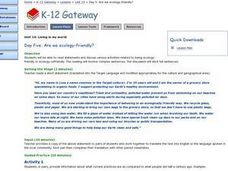Curated OER
Barter vs. Money
First graders listen to the book, Sheep in a Shop, that leads them to think about making financial decisions, trading, and the barter system. After the book is read aloud, a discussion ensues about some of the things that the sheep...
Curated OER
Deal or No Deal?
Using a game format, learners engage in an activity called Deal or No Deal. Taking real life scenarios involving items for sale, such as cereal boxes three for $5.00, they determine whether an example is a deal or not. This lesson...
Curated OER
How is the Game Played in an Economics Class?
Students research companies, choose stocks, and create portfolios online while playing the stock market game.
Curated OER
Smart- Counting Coins
Students discover the name and value of coins. In this counting money lesson, students identify heads and tails of coins and the value of each coin. Students visit websites and play games. Students then write a poem about money.
Curated OER
The Price Is Right - TV Game Show
Students play variation of TV game show "The Price is Right" to identify coins and their values.
Curated OER
Quarters and Dollars
Second graders determine value of quarters and dollars, solve real-life problems involving money, and compare values of sets of coins and bills.
Curated OER
Cyber Currency, Currently
Learners explore the value of currency and how to save and earn interest. In a key lesson plan, kids even get to purchase items in their classroom's general store. It's a fun way to learn the importance of being financially literate!
Curated OER
Unit 2: My Friends and I Day Three: Comparing Our Preferences
Students compare and contrast their characteristics. In this comparison lesson, ESL students compare and contrast personal characteristics while working in pairs. They use a Venn diagram and write in short phrases while making the...
Curated OER
I Can Buy Anything I Want: Consumer Debt and Social Responsibility
A clear, comprehensive overview of consumer debt, credit, interest, international currency, and social responsibility, this 45-minute session falters in the application stage. You'll need to create a way for learners to demonstrate their...
EngageNY
Using Expected Values to Compare Strategies
Discover how mathematics can be useful in comparing strategies. Scholars develop probability distributions for situations and calculate expected value. They use their results to identify the best strategy for the situation.
Curated OER
Is Bigger Always Better?
Explore rational numbers with the young mathematicians in your class. They will investigate decimals, fractions, and percents before ordering and comparing rational numbers. This multi-day unit includes differentiation activities and...
Curated OER
Money Matters
Students play a game called Money Matters using cut out representatives of pennies, nickels, and dimes.
Curated OER
Money: Demonstrating Coin Value up to $1.00
Students examine coin values up to $1.00 using paper coins. For this coin value lesson, students compare and contrast various coins to aid in identification, sort coins from smallest to largest, and match an equal number of pennies to...
Curated OER
Coupon Clippers: Understanding Comparative Shopping
Third graders participate in a shopping spree after listening to Pigs Go to Market: Fun with Math and Shopping. After the story is read aloud, 3rd graders answer discussion questions and review key vocabulary. Students complete provided...
Curated OER
Comparison Shopping & Buying Supplies
First graders compare prices to determine the best buy. They earn money, by correctly completing math problems. Earnings are used to purchase items from a store using exact change.
Curated OER
Classroom Supplies
Challenge young mathematicians to buy classroom supplies by staying within the means of a $1,000 budget. The mathematical activity provides learners with the opportunity to decide what items from the supply list would benefit a class of...
Curated OER
Making a Living and Leisure Activities
Students investigate the economic and daily activities in a typical African community. They design and construct a small scale house, play an African board game, create African money, discuss vocabulary, and write an essay.
Curated OER
Pocket Change
Students practice identifying coins and their values. In this money identification lesson, students play a game, where they toll a coin, determine the value, and compare totals to win.
Curated OER
Nickel/Penny Grab
First graders examine the coins nickels and pennies. In this math instructional activity, 1st graders compare the value of the two sets of coins and determine their value. Additionally, students explore counting sets of coins that...
Curated OER
The Cube and Coin Challenges
Second graders participate in several games based on colored cubes and coins. They try to figure out the relative rate at which things happen and assess the concept of playing a fair game with their peers. Each student compare familiar...
Curated OER
Are We Ecology-Friendly?
Students explore ecology. In this ecology lesson, students read scenarios, discuss them in groups and decide if they are eco-friendly or not. Students discuss the differences in eco-friendly practices fifty years ago and now. Students...
Curated OER
Medieval Money
Students investigate the history of money as it was back then compare to now. In this algebra lesson, students analyze the type of money used in medieval times, the value of the currency and the coins used. They make a budget using...
Virginia Polytechnic Institute and State University
Lesson Plan: Omelet Cooking Principles
Although designed for a foods lab, the information in this resource might be just the thing for your own recipe notebook. Illustrated, step-by-step directions for making the perfect omelet, egg-citing puzzles, games, and even...
EngageNY
The Difference Between Theoretical Probabilities and Estimated Probabilities
Flip a coin to determine whether the probability of heads is one-half. Pupils use simulated data to find the experimental probability of flipping a coin. Participants compare the long run relative frequency with the known theoretical...

























